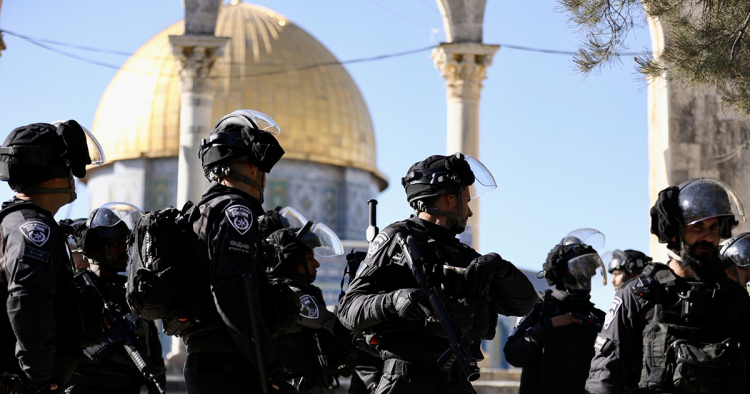On Friday, April 15, Israeli forces stormed al-Aqsa Mosque in Jerusalem’s Old City, leading to the injury of more than 160 and the arrest of more than 400 Palestinians. The raid took place in the context of increasing violence and a series of events in Jerusalem, some West Bank cities, and individual operations in Israel over the past two weeks. Domestically, the Palestinian Authority, along with Hamas and other resistance factions, condemned the successive incursions and blamed the occupation for the escalation, as have a number of Arab and other states.
Almost exactly one year ago it was precisely this sort of raid on al-Aqsa, amid the forced displacement of Palestinian families in East Jerusalem, that prompted Hamas to respond by firing rockets at Israel, setting off an 11-day war — the fourth major aggression against the Gaza Strip and conflict between Hamas and Israel since 2008. While the events now taking place in Jerusalem and the West Bank are very similar to those of May 2021, the political contexts are different on all sides. Although Israel carried out an airstrike on April 18 following rocket fire from the Gaza Strip, the situation is unlikely to lead to a repeat of last year’s Gaza war. There are four main reasons for this.
-
Israel seeks to avoid escalation: Unlike the previous government of Benjamin Netanyahu, the current ruling coalition in Israel is not interested in blowing up the situation on the ground, despite the ongoing incursions into some West Bank cities, the raid on al-Aqsa on Friday morning, and the April 18 airstrike. Prime Minister Naftali Bennett, whose fragile coalition is now facing its most serious challenge yet, has adopted a policy of “shrinking the conflict,” and more importantly, is not ready for an open confrontation with the Palestinians. Whereas the Netanyahu government had promised to strike at any and all targets of the Palestinian resistance in 2021, the current Israeli government has not made threats aimed at Hamas and other resistance factions in the Gaza Strip.
-
Hamas is not interested in another major confrontation: Despite the continuation of the Israeli siege of Gaza, the ongoing Palestinian division between Hamas and Fatah, and the delayed reconstruction since the last Gaza war, Hamas has little interest in another major confrontation. Two days before the Israeli raid on al-Aqsa, in the midst of Israeli military incursions around the West Bank that killed at least six Palestinians, Hamas’s Gaza chief Yahya al-Sinwar convened a meeting of Palestinian factions at his office in Gaza City, during which they appealed to the Palestinian, Arab, and Muslim peoples for a broad popular mobilization against ongoing Israeli policies but without threatening military escalation, as happened in May 2021. What was remarkable was that Fatah was present at the meeting, which indicates a Palestinian consensus around calming the situation in Gaza. Since no reconstruction has taken place in the embattled Gaza Strip in the year since the last aggression, Palestinian factions in Gaza have been more focused on internal demonstrations, condemnation, and planning for eventual reconstruction than a new confrontation with the Israeli occupation. Indeed, after convening a second time following Israel’s storming of al-Aqsa Mosque on April 15, Palestinian political factions in Gaza, while reiterating their support for Palestinian Jerusalemites and blaming the occupation for the attacks in Jerusalem and the West Bank, also announced contacts with outside mediators to prevent escalation in Jerusalem and maintain calm.
-
Mediators in the field: In the past, outside mediators have typically intervened after events have already escalated, as was the case in the previous four attacks on the Gaza Strip. This time, however, third-party mediators were already on the ground actively working to prevent escalation. This includes an official Egyptian security delegation engaged in some reconstruction-related activities that has been permanently stationed in Gaza for the last six months, as well as Egyptian intelligence officials in Cairo and United Nations envoy Tor Wennesland, all of whom are in regular contact with Hamas politburo chief Ismail Haniyeh and Hamas Gaza head al-Sinwar.
-
Local events versus global concerns: The Palestinian scene is directly affected by international events, most notably Russia’s war on Ukraine and its consequences. The conflict in Ukraine has consumed the attention of the international community at all levels, especially with regard to ensuring the supply of essential foodstuffs and protecting the global economy from bankruptcy, inflation, and stagnation. Given the integrated efforts to defeat Russia and prevent China from mounting a similar effort to take over Taiwan, as well as the global media’s preoccupation with Ukraine, it is not in the interest of the Palestinians to allow Israel to take advantage of the current situation and use it against them.
While the violence in Jerusalem, where events have been escalating since 2015, may not affect Gaza more broadly this time around, the situations in both Jerusalem and Gaza remain fragile and highly volatile and could blow up at any time. To prevent future outbreaks two things are urgently needed: ending the internal Palestinian division and imposing some constraints on Israeli actions, particularly the use of force, against Palestinians, their properties, and holy sites. Otherwise the cycle of violence will continue to play out over and over.
Omar Shaban is the founder and director of PalThink for Strategic Studies and an analyst on the political economy of the Middle East. The views expressed in this piece are his own.
Photo by Mostafa Alkharouf/Anadolu Agency via Getty Images
The Middle East Institute (MEI) is an independent, non-partisan, non-for-profit, educational organization. It does not engage in advocacy and its scholars’ opinions are their own. MEI welcomes financial donations, but retains sole editorial control over its work and its publications reflect only the authors’ views. For a listing of MEI donors, please click here.













